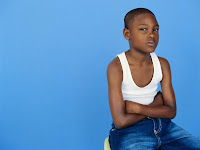Does bad parenting cause Oppositional Defiant Disorder?
Re: Does bad parenting cause Oppositional Defiant Disorder?
 I don’t think there is a causal relationship (i.e., one causes the other) between bad parenting and Oppositional Defiant Disorder – but there certainly is a correlation (i.e., one contributes to the other) between lack of appropriate parenting skills (i.e., skills needed specifically for raising an oppositional child) and this disorder.
I don’t think there is a causal relationship (i.e., one causes the other) between bad parenting and Oppositional Defiant Disorder – but there certainly is a correlation (i.e., one contributes to the other) between lack of appropriate parenting skills (i.e., skills needed specifically for raising an oppositional child) and this disorder.
Oppositional Defiant Disorder does seem to arise out of a circular family dynamic. The infant, who is by nature more difficult, fussy and colicky, may be harder to soothe. The mom or dad may feel frustrated and unsuccessful at parenting such a child. If parents perceive their youngster as unresponsive or "bad," they may begin to anticipate that the youngster will be unresponsive or noncompliant. They may then become unresponsive or unreliable in return, adding to the youngster's feelings of helplessness, neediness, and frustration.
As moms and dads attempt to assert control by insisting on compliance in such areas as eating, toilet training, sleeping, or speaking politely, the youngster may demonstrate resistance by withholding or withdrawing. As a youngster matures, increasing negativism, defiance, and noncompliance become misguided ways of dealing with grown-ups. In this way the disorder may be a tenacious drawing out of the "terrible twos."
The more a youngster reacts in defiant, provocative ways, the more negative feedback is elicited from the mother or father. In an attempt to achieve compliance, the parent and other authority figures remind, lecture, berate, physically punish, and nag the youngster. But far from diminishing defiant behavior, these kinds of responses toward the youngster tend to increase the rate and intensity of non-compliance. Ultimately, it becomes a tug of war and a battle of wills.
When such patterns typify parent-child relationships, discipline is often inconsistent. At times, moms and dads may explode in anger as they attempt to control and discipline their youngster. At other times, they may withhold appropriate consequences which soon become hollow threats. As the youngster continues to provoke and defy, parents lose control. Then, feeling regret and guilt (especially if they’ve become verbally or physically explosive), the parent may become excessively rewarding and gratifying in order to undo what they now perceive to have been excessive discipline or punitive consequences.
When a youngster starts school, this pattern of defiant behavior tends to provoke educators and peers as well. At school, the youngster is met with anger, punitive reactions and criticism. The youngster then argues back, blames others and gets angry.
These kids tend to have difficult adapting at school. Their behavior can cause disruption in the classroom and interfere with social and academic functioning. When their behavior and defiance affects their schoolwork and performance, kids often experience school failure and social isolation. This, coupled with chronic criticism, often leads to low self-esteem. Usually, Oppositional Defiant Disorder kids feel unfairly picked on. In fact, they may believe that their behavior is reasonable and the treatment and criticism they receive unfair.
Oppositional Defiant Disorder coexists with ADHD in many cases. In fact, the impulsivity and hyperactivity of ADHD can greatly amplify the non-compliance and uncontrolled anger of Oppositional Defiant Disorder. Symptoms of Oppositional Defiant Disorder may also occur as part of major depressive disorder, obsessive compulsive disorder, or mania. Some kids with separation anxiety disorder may also have defiant behaviors. Clingy attachment merges into or possibly reflects oppositional behavior. There also seems to be a correlation between Oppositional Defiant Disorder in a youngster and a history of disruptive disorders, substance abuse, or other emotional disorders in the parents(s).
==> Parenting Children with Oppositional Defiant Disorder


